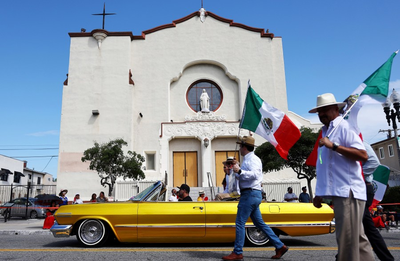
SAN DIEGO -- A bill to legalize lowrider cruising across California was signed into law by Gov. Gavin Newsom on Friday, ending a decades-long ban on the popular pastime.
Assembly Bill 436, introduced by National City Asm. David Alvarez, repealed regulations in the state vehicle code that allowed local governments in the state to place restrictions that directly target lowrider vehicles.
This includes the regulation of cruising, which is when a vehicle is driven "low and slow," on streets and the operation of vehicles that have been modified from their original design to make the body of the car closer to the ground than the bottom of its rims.
“On behalf of the thousands of advocates who supported this culturally significant legislation, the low rider communities and car clubs from all over California, I would like to thank the Governor for signing AB 436 into law," Alvarez said in a statement. "The law will allow the historical legacies of cruising to continue for the current generation and many more."
Lowrider communities across the state are already celebrating the legislative victory.
"When we found out on Friday, I started to cry because I was so happy," said Jovita Arellano, president of the United Lowrider Coalition in National City. "This was a long journey for us."
The United Lowrider Coalition worked with Alvarez to author the bill, which passed through the legislature on the final day of the session. The organization was also instrumental in the efforts to repeal the city's own ban on cruising that became permanent earlier this year.
"As we've always said, cruising isn't a crime," Arellano continued. "We're really happy that the state assembly members, the senators and the governor have embraced our culture that is really important to us."
Southern California is considered the "birthplace" of both lowriders and cruising, emerging in Chicano communities as the "hot rod" trend swept the country post-World War II.
People began customizing their cars with lower bodies, often adding colorful designs and hydraulics to allow height adjustable suspension. These modifications became an art form for those in the community, and cruising became the way to showcase that work.
Among outsiders, lowriding developed a reputation for backing-up traffic on surface streets and having links to gangs in certain areas. Fear of roadway clogging and crime prompted cities in California to start placing restrictions on the practice in the 1980s.
However, lowriders have long argued that the application of these laws by law enforcement have historically been used to unfairly targets Latinos and contributes to harmful stereotypes about the practice that are antithetical to the actual principles of the community.
"The culture of lowriding is full of family," Arellano said. "We're friends … we give back to the community all the time."
Growing up in National City, Arellano says that Sundays were the day to cruise in her neighborhood, with lowriders taking to one of the central arteries to showcase the work that they've done to their own car and connect with other community members.
But in the early '90s, city leaders followed other municipalities in the state by implementing a ban on cruising. After that, lowriders were on edge, worried about the possibility of driving their cars under any circumstances without risking a $1,000 fine or prison time.
While the ban was in effect, Arellano says she was pulled over twice by law enforcement for simply driving her car. Once she said she was even "thrown to the ground" and arrested for driving, because the officer said that her car fit the description in a crime from earlier in the day.
While National City dropped their ban earlier this year, AB 436 allows the lowrider community in municipalities where restrictions remained on the books -- like Los Angeles, Fresno and Santa Ana -- to fully embrace their culture again. The law is set to go into effect on Jan. 1, 2024.
"It's a sense of freedom," Arellano said. "Now, we are free to dive, including low and slow on the streets without having to worry about getting pulled over or ticketed."